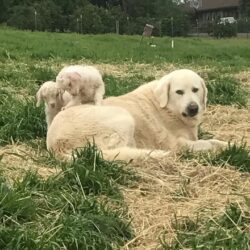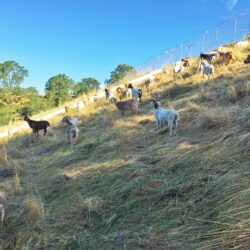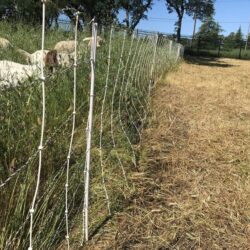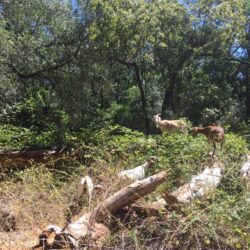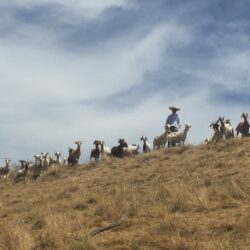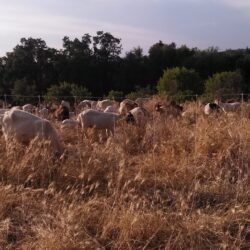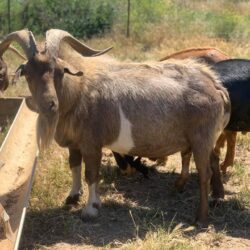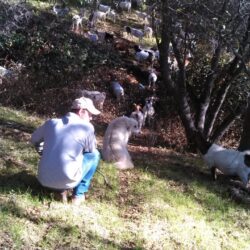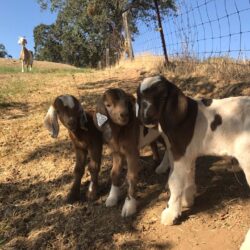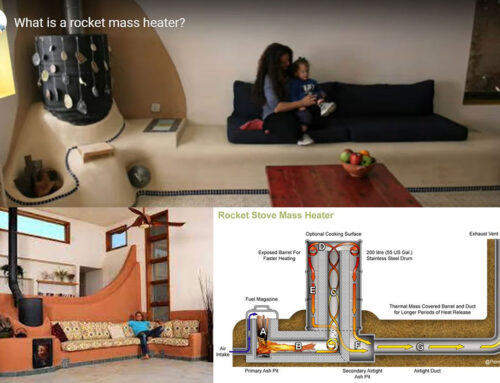*Local Learning Series written by Registered Veterinary Technician Kaitlyn Medlar, co-owner/operator NM Ranch Grazing Service in Auburn, CA.
One of the Cutest Ways to Mitigate Fire in California
You may have guessed it… Goats and Sheep!
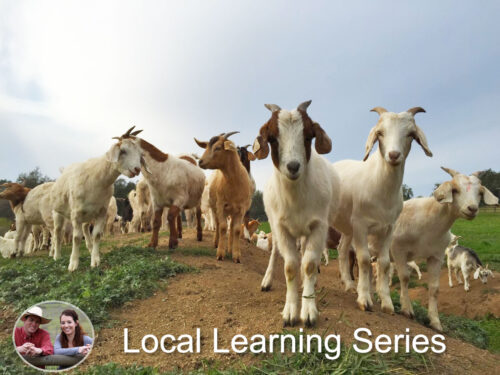


Did you know one of the most sustainable and eco-friendly ways to mitigate fire danger in the Sierra Nevada foothills is also the cutest?
The sheep and goats of NM Ranch Grazing Service start their fire prevention season in early May at the lower elevation jobs where the ladder fuels dry out the soonest. As the temperatures climb into summer we move to higher elevation. Sections where the animals are housed on a grazing job are built with temporary electric fencing to accommodate a 24 to 48-hour graze period, the paddock size varies with the type and density of the vegetation, terrain, and accessibility.
On that vegetation the sheep and goats will not only eat most all grasses and leaves of trees and shrubs; they will also have another effect on what we call “animal impact”.
Animal impact is trampling the leftovers into the top soil which effectively adds organic matter, including nitrogen, mulches the soil surfaces and captures more rainfall for less run-off come winter time. The animals also defecate in the grazing paddocks, leaving fertilizer and additional microbes to feed the soil. This combination of impacts is what large herds of elk and bison did for this eco-system for thousands of years and would be hard to simulate with mechanical options.
Healthy animals and emphasizing low-stress handling are factors of sustainability of our service. By keeping adults healthy, we are able to produce babies that are raised in the environmental factors in which they will live their whole lives; things such as the electric fencing, loading onto a trailer, moving with the aid of herding dogs, and thriving on the vegetation provided. Factors considered for the health of the animals are: weather (animals are not moved in the hotter parts of the day), having enough available fence to set up at the next location before the animals arrive (animals are not left in trailers while fencing is installed), water available for animals at time of unloading, and travel time to determine where the animals at the completed location will wait to be transported.
The vegetation that the sheep and goats eat over the fire prevention season is often not the most nutritious or palatable. For that reason they are also fed a loose protein and mineral supplement to feed the first two of their “stomachs”, the reticulum and rumen. This first part of the digestion process is what allows ruminate animals (goats are the best at this) to be able to consume and utilize woody plants, weeds, browse with high levels of tannins and even small amounts of poisonous plants.
Once the fire mitigation season is over in late September, the animals head down to alfalfa fields to eat off the stubble left over after the last cutting. Why? Because if there is just a few inches of plant left, many bugs will get into the plant and damage the stalks for the following year. When the goats and sheep eat down the alfalfa into the winter as it is going dormant the farmers do not have to spray the fields with pesticides to get rid of the bugs.
And it is on the alfalfa fields that the next generation of “fire-fighters” is born!
Ready to have these beautiful critters go to work on your property?
- Contact us at nmranch@live.com
- Answer a few simple questions about your property to get a preliminary bid, such as: water availability, approximate location, terrain, and goals of the project.
- Nathan or Kaitlyn will come out to your property to get a map of the area that needs work
- Sit back and enjoy the most quiet, peaceful “weed-eaters” around! What could be better when you are working or going to school from home during quarantine?
About the Author:
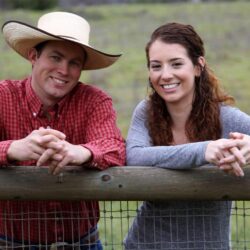


Kaitlyn Medlar is a Registered Veterinary Technician and co-owner/operator NM Ranch Grazing Service with her husband Nathan. Her background in animal health is her passion and a benefit to the company. She doesn’t just leave the animal-loving at work, Kaitlyn and Nathan share their home with their 4 border collies (“essential employees”), 3 horses, and a pot-belly pig. In the “slower” season, Kaitlyn spends time with her horses and, with Nathan, enjoys road-trips.
Contact Kaitlyn and NM Ranch by visiting their facebook at www.facebook.com/nmranchgoats or by phone at (916) 825-0933.


